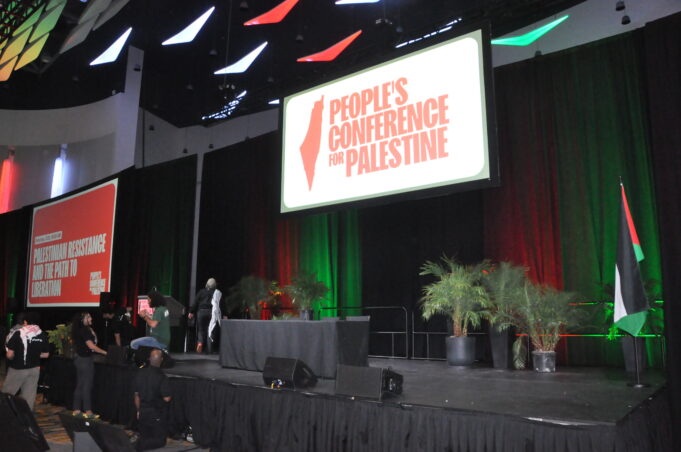DETROIT—People all over the world historically and currently impacted by colonialism, imperialism and Zionism are standing with Palestine. The People’s Conference for Palestine, which took place in Detroit on May 24-26, homed in on the global support for the Palestinian people and the connections between past and present freedom and resistance movements and the movement for a free Palestine. (See The Final Call, Vol. 43 No. 36).
“We can say without a shadow of a doubt in this political moment that Palestine is the roadmap for global justice, that Palestine is the roadmap for freedom of all people,”
Lara Kiswani, the executive director of the Arab Resource and Organizing Center, a lecturer at San Francisco State University and an advisory board member of Critical Resistance, said during a conference plenary session on “The Movement for Palestinian Liberation in North America.”
“How do we build power together? How do we as Arabs and Palestinians, how do we understand our struggle as not only about freeing Palestine and contributing to the liberation of our people in Palestine but in service of all movements against U.S. imperialism?” she questioned.
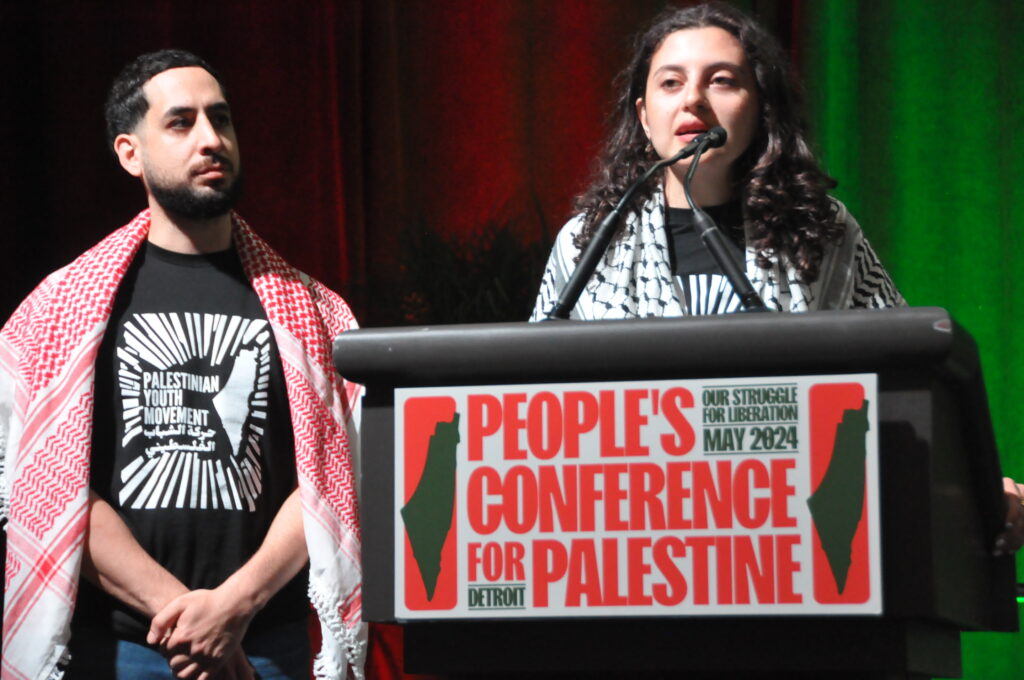
“And how do we learn from other movements, many of which are represented in this room, other movements in this country, particularly the ongoing struggle for land back and decolonization for the Indigenous people of this land? And how do we learn from the Black freedom struggle and the significant role it plays in shaping our work?”
She also spoke on the importance of cross-movement building.
“How are we building a global anti-apartheid movement? We can say today, we have labor for Palestine. We have health workers for Palestine. We have writers for Palestine. We have teachers for Palestine. We have tech workers for Palestine, artists for Palestine and of course, students for justice in Palestine.
Our movement here in the belly of the beast must understand that when we call for an end to aid to Israel, we are emboldening calls to defund the police; we are emboldening calls to abolish prisons; we are emboldening calls to defeat global fascism,” she said.
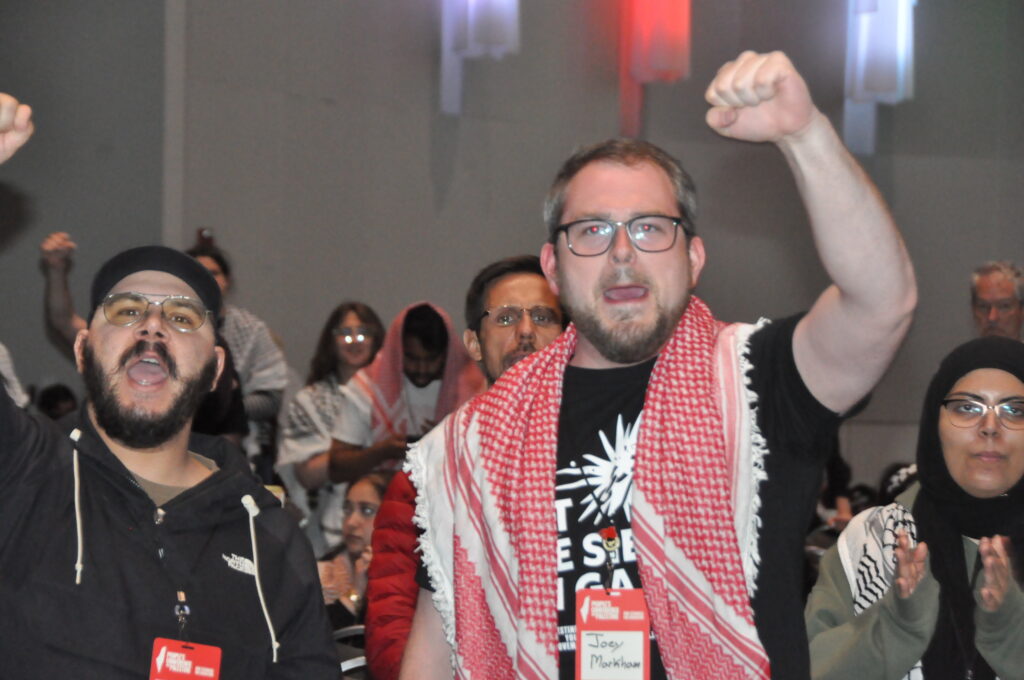
“And we know we cannot fight for Palestine unless we also fight against settler colonialism here, unless we fight against militarism and U.S. imperialism in all its forms.”
The Middle East
In a plenary session on “Palestinian Resistance and the Path to Liberation,” Raja Abdulhaq, a Muslim Palestinian political activist, community organizer, and researcher, discussed the historical and current relationship between Palestine and Iran.
In 1979, the Islamic Revolution in Iran took place, which has influenced Palestinian resistance movements and has served as a model of revolution against Western domination, he said.
Today, he noted, due to Iran’s support of Palestine, Iran is being used to demonize Palestinian resistance and the Palestinian struggle.
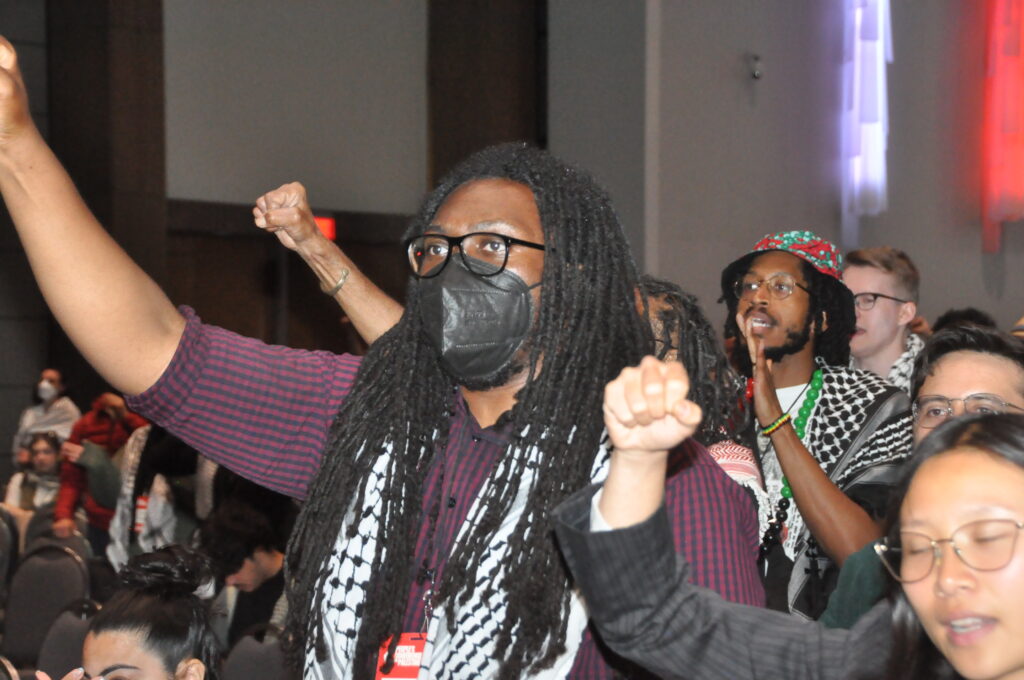
“Every time there is any kind of foreign support to Palestinian resistance, there is always these ready accusations that they are clients or proxy militias that work for the enemy of the U.S., and this is, of course, an easy propaganda that is always used to support and to legitimize and justify American hegemony in the region,” he said.
He also drew parallels to the siege on Iran and the siege in Gaza.
“The states within the Middle East or in that region are not allowed to have independence by themselves. They’re not allowed to liberate their country from Western hegemony, whether it’s direct colonization that we have witnessed in the 50s and the 60s or the aftermath of what we know today as neocolonialism, where there’s no more boots on the ground, but there’s a political and economic hegemony that exists in that region,” he said.
In a May 25 session titled “Every Time the Media Lies,” Mnar Adley, an award-winning journalist, editor, founder and director of MintPress News, expressed heartfelt words on Yemen’s support of Palestine.
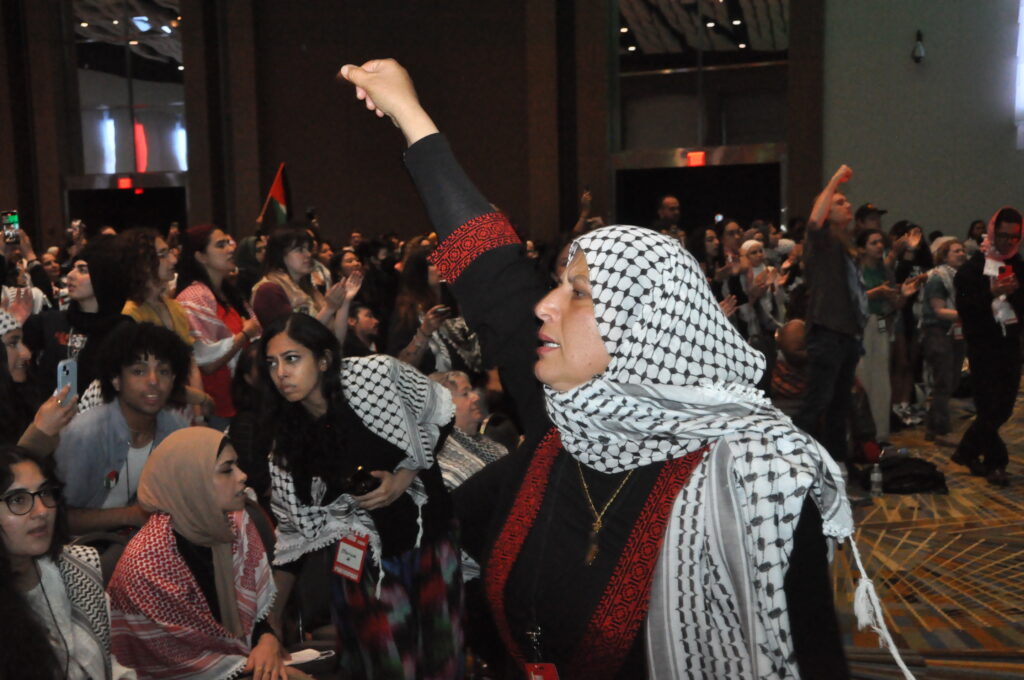
“Never have I seen such unity across political lines against U.S. support for Israel. And when I look to Yemen, the poorest country in the Middle East, we need to just give a huge shout-out to Yemen right now. I’m getting emotional talking about Yemen because I have covered Yemen for over a decade while they endured one of the worst genocides,” she said.
“What we see happening in Gaza is horrific, but also Yemen has endured a starvation campaign where 23 million people have been starving because of the U.S.-Saudi-led coalition,” she continued.
“And they are standing up for Palestine, risking their everything, showing the world what real courage is like. Every Friday, millions of Yemenis march the streets of Sana’a and say we don’t care, bring the war here.”
Support in the Motherland
The session “Every Time the Media Lies” occurred on African Liberation Day. Panelist Eugene Puryear, a journalist, organizer, author and host on BreakThrough News, spoke on the strength of the Palestinian solidarity movement on the African continent.
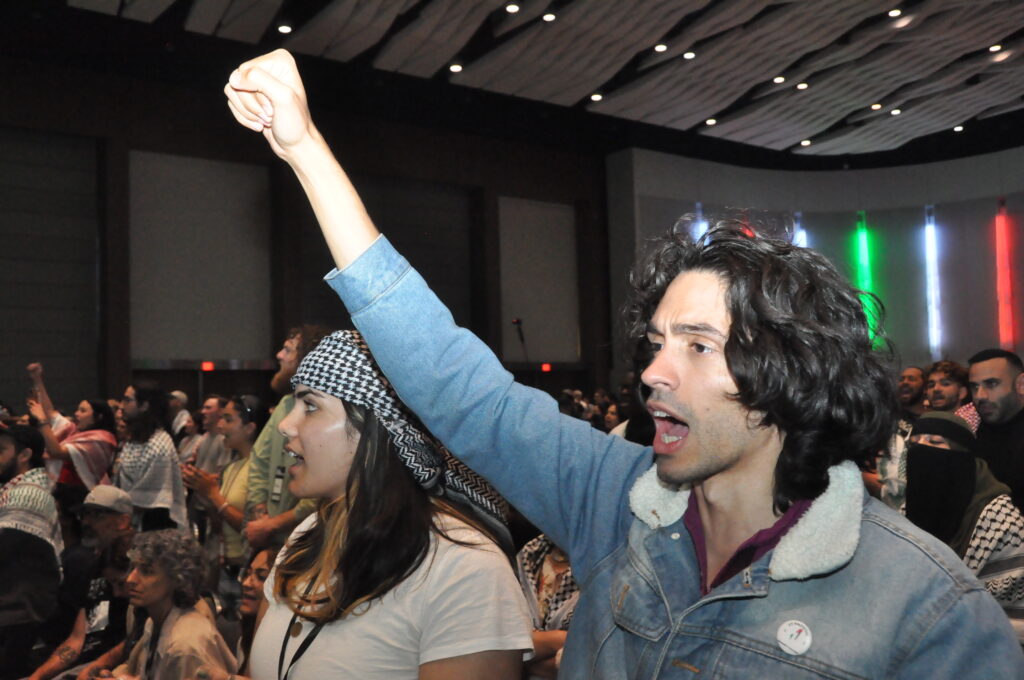
South Africa has led the charge by putting continued pressure on the International Court of Justice (ICJ) to hold Israel accountable for Palestinian genocide. Mr. Puryear also acknowledged Namibia, Algeria, Eritrea and Western Sahara for their support and statements of solidarity.
“In Egypt, where unfortunately there are many obstacles to protesting, but I’ll have you know [is] one of the strongest boycott movements happening anywhere in the world.
Not just Israeli goods, American goods, European goods, where millions of Egyptians are voting with their pocketbooks in extremely dire circumstances in order to make sure that they are also raising their voice against the genocide and ethnic cleansing,” he said.
“In Somalia where we saw thousands of young people take to the streets in a northern village in solidarity with the young people of Gaza who are being killed. Thousands of people who have gone to the streets in Accra, Ghana,” he continued.
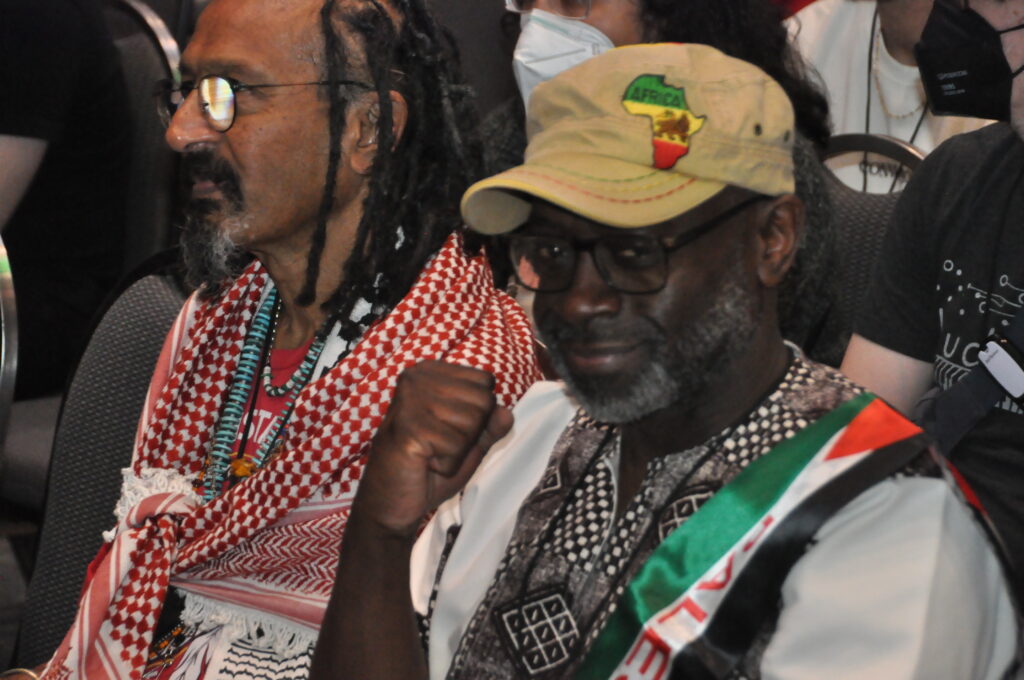
He gave special recognition to Nigeria. During an April 5 rally on Quds Day, an annual pro-Palestinian event, in Kaduna, a city in northern Nigeria, police killed four people and injured 20.
Senegal’s president and prime minister also stand in support of Palestine. “After three years of huge mass protests against the neocolonial, pro-French regime, we’ve had a new government come to power. You’ve heard a lot about it, and the mainstream media is like ‘Oh, it’s so great.
Elections, democracy,’” Mr. Puryear said. “But what wasn’t reported in the New York Times or all these other places that said it was so great was the Prime Minister Ousmane Sonko who said, just about a week and a half ago at a press conference that ‘we, the people of Senegal who have waged this struggle,’ that we, and I quote, ‘stand with Palestine until liberation.’”
Connected global struggles
Conference organizers held a pivotal session on “Palestine and Internationalism,” where a diversity of panelists discussed the shared global struggle against Zionism, imperialism and colonialism.
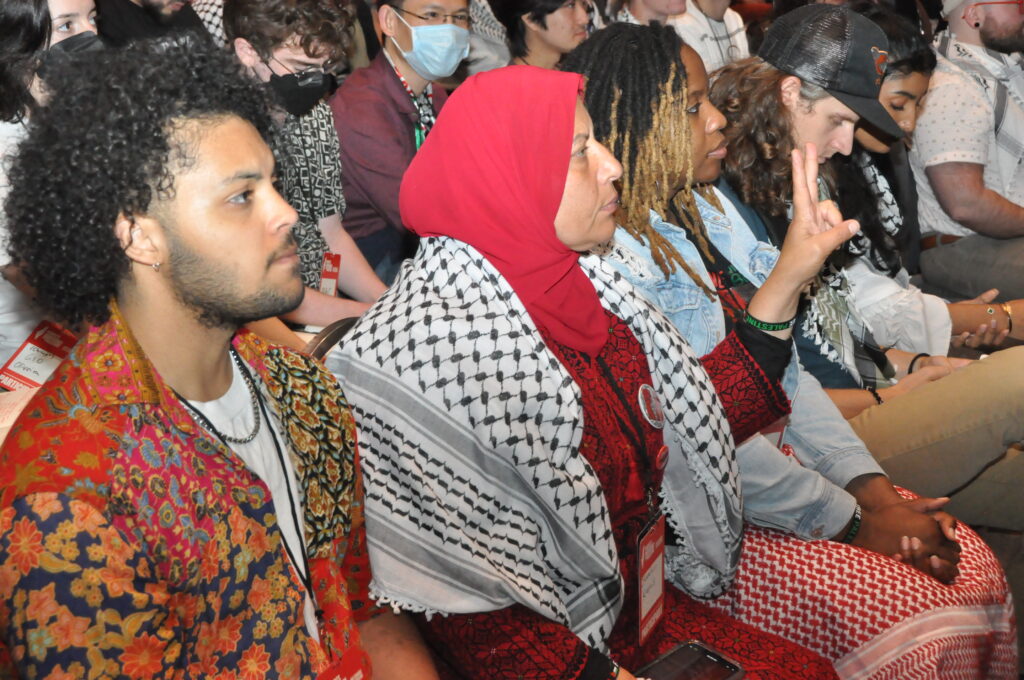
Mandla Radebe, author, associate professor at the University of Johannesburg and the Chairperson of the South African Communist Party in Gauteng province, expressed the similarities between South African apartheid and what is happening to the Palestinian people.
Similarities he listed include: limited self-governance in pseudo-national homelands; permits, checkpoints and pass laws; land ownership and non-citizenship.
“The people of Palestine living in non-annex portions, in particular in the West Bank, do not have Israel(i) citizenship. They do not have voting rights. Their movement is restricted, exactly what happened to us in South Africa, where Africans … were regarded as non-citizens. They required passports basically to be in their own country. They did not have voting rights. They did not have anything,” he said.
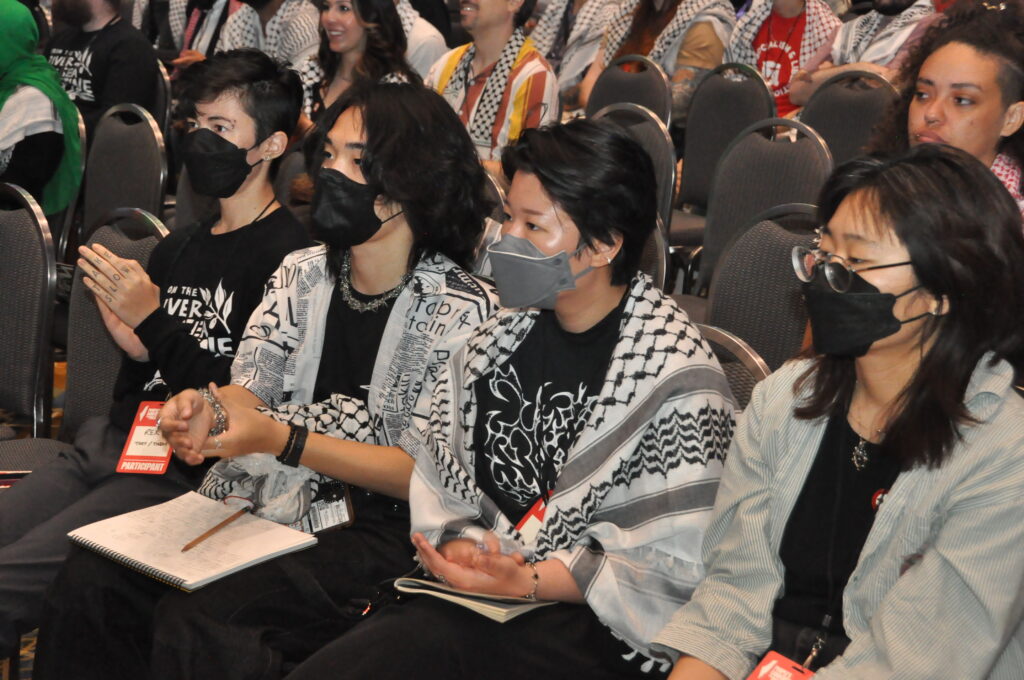
He voiced that the similarities between the two struggles are the reason why the African National Congress, one of South Africa’s parties, and the country’s national liberation movement formed close alliances with the Palestine Liberation Organization (PLO) as early as the 60s.
He also called out the historical trend of White colonizers severing ties with their countries of origin only to situate themselves within the nation they are colonizing.
“It is precisely the reason why we believe that international solidarity as one of the pillars of the struggle that helped us to defeat apartheid in South Africa is one of the critical things that we have to help the people of Palestine with,” Prof. Radebe said.
Dominico Vega, a Southern California-based organizer born in the Philippines and secretary general of Anakbayan USA, boldly declared to the listening audience that the Filipino movement for national democracy stands in the firmest solidarity with the Palestinian people.
He acknowledged that though the Philippines was granted independence in 1946, the country is still under the control of “the U.S. imperialist machine through its economy, the military, culturally and every other form that tries to oppress and suppress and exploit the Filipino people.”
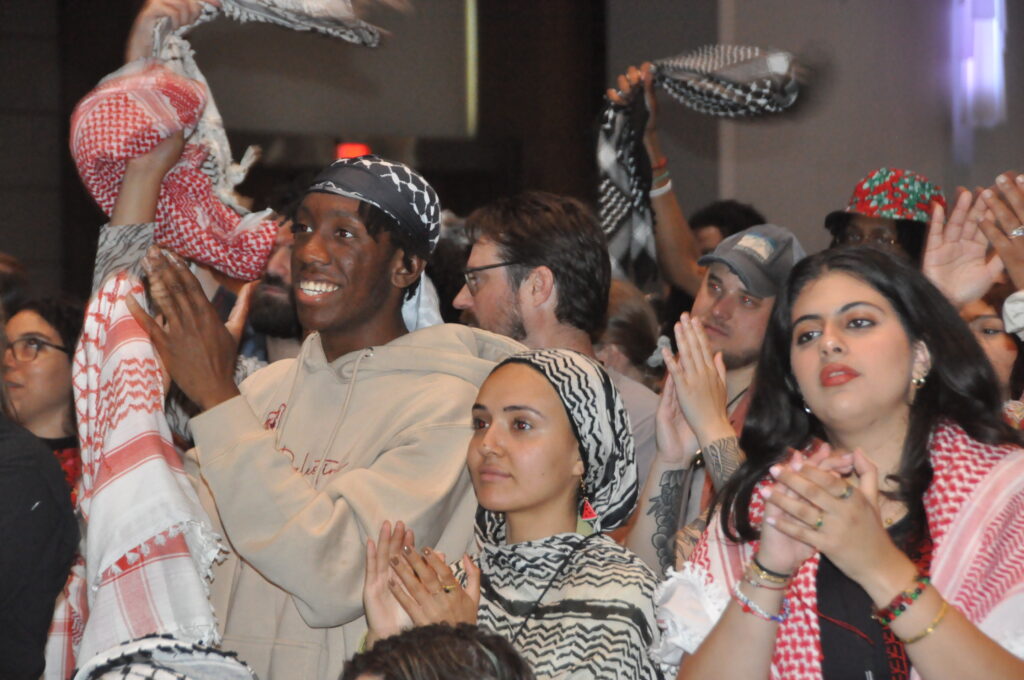
“But it is through that experience that we have with U.S. imperialism, that foments the deep sense of solidarity that we have with the Palestinian people,” he added.
He explained how many Filipinos are forced to move abroad due to not having access to their own land. “That’s why we find ourselves here in the belly of the beast. That’s why we find ourselves in Europe, in other parts of Asia, in Africa, in Latin America. Wherever you go there are Filipinos because 10 percent of our population have been displaced because of U.S. imperialism,” he said.
“But in every corner of the world where there are Filipinos, you’ll be sure to find that there are Filipinos who are marching in the streets in solidarity with the Palestinian people.”
Ju-Hyun Park, a writer and a member of Nodutdol for Korean Community Development Ju-Hyun, traced the different national liberation struggles back to World War II.
“This is the beginning of the ongoing Nakba in Palestine. This is the beginning of the system of Apartheid in South Africa. This is the heat of Hukbalahap war in the Philippines, a brutal campaign of state terrorism against that very nation’s independence fighters, which was backed, financed, and directed by the United States in the name of anti-communism.
And in Korea, this was the time of the dawn of national division and the beginning of what the United States calls the Korean War but what we Korean patriots call the ‘Great Fatherland Liberation War,’” the Korean writer said.
“Why did all of these historic catastrophes, these many Nakbas, happen at the same time? We can look to the history of the time, the change in the imperialist system, the rise of the U.S. as the dominant power. We can look to the greed of the oppressor, their insistence on an international order where the darker nations of the world live fragmented, exploited at their hands.”
Voices from the people A diversity of people attended the People’s Conference for Palestine.
Arama Rata, who is Māori, traveled from New Zealand to attend the conference. She is with the organization Matika Mo Paretinia. “When we see the struggle that’s happening in Palestine, we can immediately relate to that struggle,” she said to The Final Call.
“We still suffer from the ongoing effects of settler colonialism and racism in our country. When we see what’s happening in Palestine, our hearts go out to them, but our struggle and our solidarity is aligned with theirs. We’re very committed to doing what we can in support of their struggle, and part of that is struggling against colonialism in our own country as well, because we’re fighting the same enemy,” she added.
Rata listed out some of the things Indigenous people in New Zealand have faced and are facing, including invasion, war, dispossession, disease, impoverishment, disproportionate incarceration and premature death.
“We’ve just selected a far-right government, and they are launching an attack on nature, an attack on Indigenous people. They’re coming after our treaty rights,” she said. “We’re seeing the rise in far-right and the rise in fascism across the Global North.
And so, we see Palestine as being at the tip of the spear in the struggle against colonialism and imperialism, and so we believe that freedom for Palestine broadens the horizon of possibility for ourselves and our liberation struggle and for the struggle for liberation across the Indigenous world and the Global South.”
While in Detroit, she learned about tactics she could take back home when organizing and protesting.
Jawahir Kamil has been a resistance fighter since she was a child. She is from the Old City of Jerusalem and has been in the middle of the Palestinian struggle since she was young. She currently lives in Atlanta and is part of the Party for Socialism and Liberation.
“How do we move forward? What do we need to do extra? What do we need to do as an activist, as a protestor, as just regular people?” she questioned. “What do we need to do to make this movement and to accomplish for people in Gaza and people for us here in the United States?”
She noted to The Final Call how the money the Biden administration is using to fund Zionism could go toward taking care of people in the U.S., including building a better healthcare system, building homes for the homeless and getting rid of student debt.
“And the other thing is, our duty is to stand up with everybody, not just with Palestinians. With anybody. It’s not about Palestine. As a human being, and that’s what this revolution is about, and that’s why everybody is standing up in the world with the Palestinian(s),” the Palestinian activist said.
“It’s a revolution to wake up the people themselves here in the United States about their government, about their policies with the other governments in the world and, of course, to stop aid to Israel, the Zionists,” she added.
Jessica Ingram, also with the Party for Socialism and Liberation in Atlanta, expressed her thoughts on the interconnected struggle.
“We’ve been in this struggle with Palestine, and we’re going to continue to be in this struggle because we recognize the interconnectedness of our struggles,” she said. “The anti-Zionist, Palestinian struggle for liberation, the Black liberation struggle, every struggle, it’s interconnected.”
Abdul K. Muhammad contributed to this report. Additional coverage from the conference will be in future editions of The Final Call.












